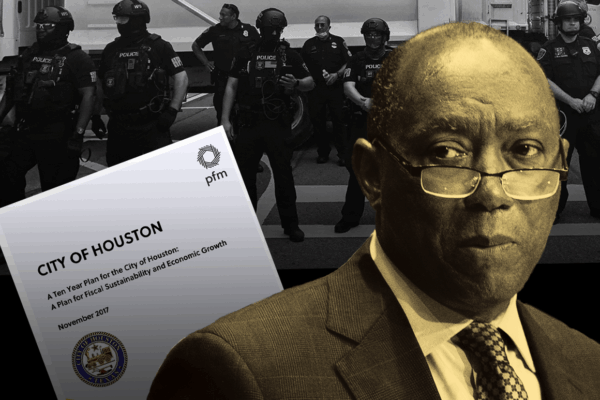This piece was originally published in the Houston Chronicle.
In the last two weeks, tens of thousands of people have taken to the streets in Houston calling for justice for George Floyd and an end to systemic racism.
Nowhere does systemic racism rear its ugly head more visibly than in our police departments, which is why people everywhere are demanding a complete reimagining of the role of police in our society. On June 9, the same day that George Floyd was being laid to rest, more than 60 people spoke before the Houston City Council, calling for reductions in the police budget, limitations on what police are asked to do and investment in programs that make communities safe.
City council’s answer on Wednesday? An almost unified call to study the issue, refer it to a committee and increase the police budget for 2021. Consider this: Austin voted for major cuts in its police budget; Dallas postponed the vote on its police budget; Harris County earmarked $25 million for immediate investments in diversion programs. Mayor Sylvester Turner announced yet another study group and increased the police budget by nearly $20 million.
The mayor shouldn’t pretend that the calls for police reform were suddenly sprung on him this week. His own transition team in 2016 made a litany of reform recommendations. Our organizations participated in the committee, as did senior members of the mayor’s administration. Then in 2017, city council spent $565,000 on a 10-year financial plan that included recommendations to cut some of the 75 percent of the budget spent on public safety over that time span.
Houston does not need another study. What we need is action on the existing recommendations for police reform. After participating in the transition committee, our organizations established the Right2Justice Coalition. We have met regularly to address ongoing issues of policing and criminal justice in Houston and Harris County. Today, we are publishing a progress report of existing recommendations from Mayor Turner’s 2016 Transition Committee on Criminal Justice and the 2017 10-year financial plan.
The progress report shows that the city has implemented only a few of the recommended reforms, the most significant being the consolidation of the city’s jails with Harris County in 2019. It has failed to adopt recommendations to develop, in partnership with grassroots organizations, a plan for community policing, to enact a cite and release policy to divert people accused of minor offenses from the criminal justice system, to combine 211 and 311 to better meet residents’ needs for non-police services, and to implement a body cam video release policy that “maximizes public access to footage in a prompt manner.”
And instead of civilianizing 443 positions as the 10-year plan recommends to save $5-10 million, the administration has increased the number of officers by 81 and shrunk the number of civilian positions by 258. Delays in implementing these recommendations in the last three years have further eroded public trust. Turner and Houston Police Chief Art Acevedo’s actions speak louder than words — by that standard, their message is unchanged.
In front of a national audience at George Floyd’s funeral, Turner promised bold reform. The executive order he touted is largely a restatement of existing Houston Police Department use-of-force policy, though changes now require the mayor’s approval.
This is not the way to honor George Floyd’s memory, and it isn’t the way to end police violence against Black and Latino people. The time for action is now. The police union contract was last negotiated in 2018 and will automatically renew in December 2020, if the city council does not adopt a new contract by Sept. 30. Negotiations have happened in secret and out of public view. This is unacceptable.
As members of the mayor’s Transition Committee on Criminal Justice, we want a seat at the table with other groups to observe negotiations and ensure the contract is updated to include key provisions, including:
- As this newspaper insisted in its June 11 editorial, increased independence in police oversight, with investigatory powers resting outside the chain of command;
- Ending the 48-hour rule that gives officers accused of misconduct a full two days after an incident before they submit to an interview and that allows them to see any evidence against them in advance;
- Eliminating rules that block disciplinary action within 180 days after alleged misconduct by an officer; and
- A fair discipline and appeals process so that police officers and the police union are not the only ones appointing arbitrators.
The people of Houston cannot wait months for another task force to reach the same conclusions that other task forces have already reached. The city council and the mayor must take action now if they want to make Houston a place where Black Lives Matter.
The #Right2Justice Coalition includes the ACLU of Texas, Anti-Defamation League, Earl Carl Institute for Legal and Social Policy, Houston Immigration Legal Services Collaborative, Immigrant Resource Legal Center, Texas Advocates for Justice/Grassroots Leadership, Texas Appleseed, Texas Civil Rights Project, Texas Organizing Project, and United We Dream.


